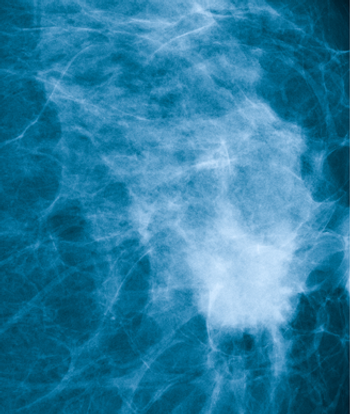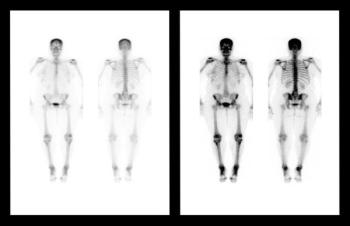
Patients with CML who are treated with dasatinib commonly experience lymphocytosis, and the condition is associated with higher response rates and increased survival in patients who are refractory or intolerant of imatinib.

Your AI-Trained Oncology Knowledge Connection!


Patients with CML who are treated with dasatinib commonly experience lymphocytosis, and the condition is associated with higher response rates and increased survival in patients who are refractory or intolerant of imatinib.

Making the decision to die at home rather than in a hospital setting resulted in a similar or longer survival, according to the results of a study.

People at high-risk for lung cancer with a clean annual low-dose CT scan had a lower incidence of lung cancer and a lower risk of dying from lung cancer compared with all high-risk participants undergoing screening.

The phase III HYPRO study failed to prove the non-inferiority of using hypofractionated radiotherapy compared with fractionated radiotherapy for late genitourinary and gastrointestinal toxicity in men with intermediate- or high-risk prostate cancer.

In this March 2016 news roundup we highlight two new FDA indications, chemotherapy’s long-term effect on fertility, the link between BMI and thyroid cancer, and more.

An ASCO expert panel has endorsed a Cancer Care Ontario guideline on the role of patient and disease factors in the selection of adjuvant therapy for women with early-stage breast cancer.

Women who were treated with chemotherapy for a childhood cancer still had a good chance of becoming pregnant later in life, according to the results of a new analysis.

Ultrasound proved better than tomosynthesis at finding breast cancer in women with dense breasts where mammography had not detected any cancer.

Almost 29% of all cancer survivors in the United States have been burdened with financial issues as a result of their diagnosis and treatment.

Chemotherapy-induced peripheral neuropathy (CIPN) is a common treatment-related side effect of several widely used drugs. Agents known to cause CIPN include platinum analogs, antitubulins, proteasome inhibitors, immunomodulatory agents, and some of the newer biologics.

Clear guidelines about the utilization of MRI in breast cancer detection and management are needed, as the modality is being overused in women for whom it offers few benefits (and potential harms), and underused when it might be appropriate.

Do you know what percentage of lung cancer patients present with intracranial metastases? Or the most common renal abnormality seen in the presence of lung cancer? Answer these questions and more.

Survivors of adolescent and young adult cancers have more than twice as high a risk of developing cardiovascular disease than people without a cancer history, according to a large cohort study.

A large cohort study showed that the risk of colorectal cancer is increased following a diagnosis of prostate cancer, suggesting colorectal cancer screening should be considered following a prostate cancer diagnosis.

Do you know the most common site of metastasis in soft-tissue sarcoma? Or which histologies are most sensitive to chemotherapy? Answer these questions and more.

Men who receive radiation therapy as treatment for their prostate cancer may have an increased risk of developing a secondary cancer, according to a meta-analysis of observational studies.

US-born Hispanics are more likely to get hepatocellular carcinoma and to die from chronic liver disease compared with their foreign-born counterparts.

Analyses from the phase III ALSYMPCA trial showed that treatment with radium-223 resulted in quality-of-life improvements over placebo in patients with castration-resistant prostate cancer and symptomatic bone metastases.

In this news roundup we highlight new FDA indications, the overuse of advanced imaging in breast cancer, MAPK inhibition in melanoma, and more.

A study including nearly 30,000 women found that newly diagnosed early-stage breast cancer patients often undergo advanced imaging tests, in spite of recommendations against this practice.

A pilot program that integrated costs associated with some of the most common cancer treatment protocols with electronic medical records was successful in providing value to both physicians and patients.

A simple quality improvement initiative involving an improved patient access center and patient education resulted in a 60% reduction in the use of ER visits in oncology patients.

ASCO updated guidelines, recommending that higher-risk premenopausal ER-positive breast cancer patients receive ovarian suppression with adjuvant endocrine therapy.

Everyone wants their doctor to be compassionate, but what about leadership? Cancer patients may be looking for these seven traits of leadership in their oncologists.

A panel of experts at the ASCO have reviewed and endorsed Cancer Care Ontario’s guideline on Active Surveillance for the Management of Localized Prostate Cancer.

This slide show includes some of the top highlights from the 2016 ASCO Cancer Survivorship Symposium, including studies on whether lymphoma survivors receive the recommended care, how personalization improved survivorship care plan adherence among breast cancer patients, and more.

A number of clinical and sociodemographic factors, including age and gender, were found to be independently associated with fatigue and depression among cancer patients who were treated with hematopoietic cell transplantation.

Some adult-onset cancer survivors have an increased risk of developing cardiovascular disease later in life compared to noncancer controls.

The 2012 change in guidelines regarding PSA testing for prostate cancer had a different effect on testing rates depending on which physician specialty was doing the testing.

ASCO has published a guideline on biomarker use to guide decisions for adjuvant systemic treatment for women with early-stage, invasive breast cancer.